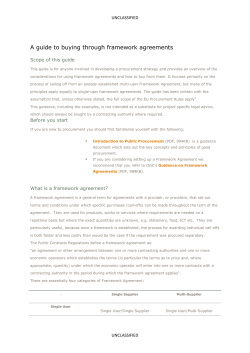
Guide on How to do Business with Durham County Council 1
Guide on How to do Business with Durham County Council 1 Contents: Page 1. Introduction 3 2. Rules and Regulations 7 3. Registering your organisation on the NEPO portal 10 4. Finding opportunities and registering your interest 11 5. Completing and submitting a tender 12 6. Contact Details 15 2 1. Introduction Durham County Council Corporate Procurement Vision: “To ensure that we carry out all commissioning and procurement activities collaboratively and in an economic, environmental and socially responsible manner on behalf of the council and its key stakeholders, whilst making sustainable purchasing decisions that promote the long-term interests of the communities we represent.” About this Guide This guide is designed to assist organisations who wish to supply Durham County Council with goods or services, or carry out works on our behalf. The guide helps in the following ways: It explains how organisations can be alerted to the opportunities which are available to supply the council. It explains how to bid for council work and also what information will be required. It highlights contact points which will provide assistance to suppliers on issues covered within the guide. The guide outlines the rules and regulations that the council must follow in procuring goods, services and works. Durham County Council encourages competition and welcomes bids from new and established suppliers, especially from local small and medium sized enterprises (SMEs), third sector organisations, and social enterprises. What are the benefits of working with the Council? As a business partner, the council is: Fair Non-discriminatory Professional A long established organisation Prompt to pay There is a great deal of competition for Durham County Council contracts, and this guide cannot assure individual organisations success. It should however provide sufficient information to give the opportunity to give a quotation or tender for council work. 3 Who are Durham County Council? Durham County Council is one of the largest local authorities in the UK and the largest in the North East. It is made up of an elected assembly of 126 councillors representing a population of over 500,000 people. The council is responsible for the efficient and effective provision of a wide range of public services to the people of the County. As an authority, Durham County Council spends over £520 million a year on the provision of goods, services and works. The Council’s procurement activities enable services to be provided in an efficient, cost-effective and sustainable way and assist the Council to realise the Sustainable Community Strategy vision for the county of ‘an altogether better Durham’. Within this, the council pursues six priority themes: Altogether wealthier - Creating a vibrant economy and putting regeneration and economic development at the heart of all our plans Altogether healthier - Improving health and wellbeing Altogether safer - Creating a safer and more cohesive county Altogether better for children and young people - Enabling children and young people to develop and achieve their aspirations, and maximise their potential in line with Every Child Matters Altogether greener - Ensuring an attractive and liveable local environment, and contributing to tackling global environmental challenges Altogether better council What is procurement? Procurement is the process of acquiring goods, works and services from third parties. It includes both the process by which requirements are defined and contracts are awarded, as well as the management of contracts once established. Effective procurement seeks to achieve value for money – which is not simply about the cheapest possible option, but an optimum balance of quality and whole-life cost. Procurement is distinct from purchasing which is the transactional process of ordering, receiving, and paying for goods and services. A related process is commissioning – this is the strategic process by which needs are identified and assessed, desired outcome(s) are defined, and solutions designed to achieve those outcomes. Grants are payments the Council may give from time to time to certain organisations for certain purposes (e.g. to help a voluntary group provide holiday activities for disabled children, or to help a local cricket club repair its changing room) as the Council agrees with the recipient. Recipients will usually be not-for-profit groups (e.g. charities, voluntary groups, local sporting clubs, artistic groups etc). Grants are generally not provided for commercial or political purposes. The awarding of grants falls outside the procurement process. 4 The Commissioning and Procurement Cycle 5 Durham County Council’s Procurement and Commissioning Strategy The aims of our strategy are to: i) Support commissioning and procurement activities across the authority to ensure corporate-wide consistency, efficiency and innovation in line with corporate strategic objectives. ii) Provide clear, strategic guidance from the corporate centre to enable and empower staff engaged in commissioning and procurement in service areas to make decisions and take actions in the most strategically informed, effective and professional ways possible. iii) To maximise opportunities to realise efficiencies and achieve value for money through commissioning and procurement activities. iv) To embed an understanding of, and commitment to, building sustainability into all commissioning and procurement activities in order to meet wider social, economic and environmental outcomes for the County and beyond, in line with the Council’s Sustainable Community Strategy and our duties under the Public Services (Social Value) Act 2012. The latest version of the Council’s Corporate Strategy for Commissioning & Procurement is available on our website at www.durham.gov.uk Durham County Council does not operate in isolation and has a strong regional presence as a member of the North East Procurement Organisation (NEPO), as well as working in collaboration with other Local Authorities and public sector bodies in the region. 6 2. Rules and Regulations Local Authority procurement is governed by procurement regulations at a European, National and Local level. Local Rules Durham County Council has Contract Procedure Rules which officers must comply with. These are part of the Council’s Constitution which is available on the Council website. In addition we must comply with a wide range of UK and European Union procurement law. Officers will ensure that any agents, consultants and contractual partners acting on their behalf also comply with the requirements. Contract Procedure Rules: The basic principles of the Contract Procedure Rules are that all procurement procedures must: realise value for money by achieving the optimum combination of whole life costs and quality of outcome, be consistent with the highest standards of integrity, operate in a transparent manner, ensure fairness in allocating public contracts, comply with all legal requirements including European Union (EU) treaty principles, support all relevant Council priorities and policies, including the Medium Term Financial Plan, and: comply with the Council’s Corporate Strategy for Commissioning and Procurement, and the Sustainable Commissioning and Procurement Policy. What does the Council buy? The procurement functions of Durham County Council are carried out in both Corporate Procurement and a range of other service areas, including: Direct Services Technical Services Children and Adults Services Transport Regeneration and Economic Development By signing up to the NEPO Portal (see section 3) you will be notified, by email, of advertised Durham County Council contract opportunities, related to the categories you select when registering. 7 European Rules All public sector contracts, irrespective of their value within the European Union (EU), are covered by the principles of a treaty which incorporates the free movement of goods and services and which seeks to prevent discrimination against firms on the grounds of nationality. The key EU treaty principles are: Equal treatment (non-discrimination fairness) • Treat all tenders in the same way without favour or prejudice • Avoid brand names when specifying and accept equivalence Transparency (openness) • Advertising appropriate to the size of the contract • Be open and upfront about selection (PQQ) or award criteria (Tender) Proportionality • Requirements must be relevant to the contract and necessary Mutual recognition • Qualifications or certificates from other member states Confidentiality • Must respect confidentiality of information received during tender process The principles of the treaty are enshrined in UK law by the Public Contracts Regulations (2006). These regulations require the Council to follow detailed procedures for all procurements above certain financial thresholds for ‘works’ and ‘goods & services’. The thresholds are reviewed every two years, most recently in January 2014, and are currently as follows: Goods and services: Works: £172,514 £4,332,012 To comply with the EU directives, the Council must follow some basic principles: A specific Tender Notice must be placed in the supplement to the Official Journal of the EU (OJEU) to give all suppliers in the EU an equal opportunity to tender. Tenders must be invited in accordance with one of the prescribed procedures (open, restricted, negotiated or competitive dialogue - there are also two separate urgency procedures). Each procedure imposes minimum time-scales covering the tender activities to ensure that reasonable time to respond to adverts and prepare submissions is given to interested parties. A notice of contract award must be placed in OJEU. Unsuccessful suppliers must be debriefed. There is a mandatory "Alcatel" standstill period, which means 10 days must be allowed between the notification of contract award and the contract signature. 8 Durham County Council thresholds Below the OJEU thresholds, the Council has its own minimum procurement thresholds, as follows: £500 - £5,000 - at least one formal quotation must be obtained £5,001- £50,000 - at least three quotations must be obtained via the ProContract system – either on a price-only basis using QuickQuote (see below) or using a Request For Quotation with a balance of price and quality. £50,001 – OJEU level - a full tender process via ProContract (but not usually advertised in OJEU) It is important to note that all quotation exercises above £5,000 in value are now conducted electronically via the NEPO ProContract system. In order to bid for DCC business you must therefore be registered on the ProContract System via the NEPO Portal. 9 3. Registering your organisation on the NEPO portal Durham County Council uses the ProContract electronic-Tendering System for all tenders and quotations. This is a shared facility managed on our behalf by the North Eastern Purchasing Organisation (NEPO). To be able to express your interest for a particular Tender you must register your organisation with the ProContract e-Tendering System. Stage 1: Visit the NEPO portal website at: www.nepoportal.org Stage 2: Click on the ‘Register as a Supplier’ link on the front page and follow the on-screen instructions. Stage 3: Once you have registered, your user name and password will be emailed to you. Please ensure that you keep your user name and password confidential. Notifications of opportunities you may be interested in will be sent to you by email – we may also use the contact details you provide if we wish to contact you directly. Please therefore make sure that your contact details are kept up-to-date. 10 4. Finding opportunities and registering your interest Once registered, you now have the facility to login to the system and view any forthcoming contracts and register your interest against them. Although the system will automatically notify you of opportunities you may be interested in – based on the product / service categories you have registered against – you may also wish to search for advertised opportunities. A brief explanation of how to do this is given below: 1. Go to the portal web site located at www.nepoportal.org 2. Click on “Supplier Area” and enter your username and password. Then once logged in, select “Search Opportunities”. 3. Search for contract opportunities using the available search criteria (e.g. you can enter a contract reference number or a contract name within the ‘contains’ field). 4. Once you have located a contract you are interested in click on the contract title and click on the “Register Interest” button. Please Note: The “Register Interest” button will only be visible during the specified Expression of Interest start/end dates and once you have registered your interest the button will be greyed out (you can hover over this to check the date and time the expression of interest was made). 5. Your contract expression of interest will be confirmed by email and on screen. 6. Once you have registered, you will either receive an email immediately inviting you to take part in an RFQ/PQQ/ITT exercise (with a link directly to the opportunity) or this will be issued once your interest has been approved. You can also access your RFQs/PQQs/ITTs by logging in as above, choosing “My Opportunities”, selecting the relevant authority from the dropdown box and this will show all available opportunities you’ve been invited to take part in. Recently introduced on ProContract is a new sub-contracting opportunities area. Suppliers can create and advertise their own subcontracts, notifying relevant sections of NEPO’s supplier base of potential subcontract opportunities (any supplier registered on the portal can utilise this facility and there is a user guide to describe the process within the Help section). To view advertised sub-contracting opportunities, simply select “Search Subcontracting Opportunities” from the Supplier Area. 11 5. Completing and Submitting a Tender Tendering and Quotation Procedures: Open Tender- all interested parties are invited to tender • Full contract documents are issued to tenderers at the invitation to tender stage. • No short listing process is used • Usually used if the tender is simple or expecting a limited number of responses Restricted Tender – any organisation my express an interest, however only organisations shortlisted by the contracting authority may tender • Two-stage process • Initial screening (Pre Qualification Questionnaire) – a limited number of bidders then go through to full tender stage • Used for more complex tenders, or where larger interest is anticipated Request for Quotation(RFQ) – a minimum of three relevant organisations invited to quote • Used for exercises between £5,000 and £50,000 in value where we wish to assess both price and quality. • Similar to an Open Tender, but with a simplified process due to the lower value. • At least three quotations will be invited – although in some cases the RFQ will be “Open” so that any interested party may bid. Quick Quote – a price-only quotation exercise designed to give local suppliers a greater opportunity to participate • Used for exercises between £500 and £50,000 in value where we have a clear requirement and wish to award on price only. • System automatically selects two local suppliers and two non-local suppliers to be invited to quote. Up to three additional suppliers (for a maximum of 7) may also be invited at the Council’s discretion. • “Locality” based on County Durham geographic postcode area (so please ensure the system has your up-to-date address). The Public Contract Regulations also allow for alternative methods of procurement, including the Negotiated Procedure and Competitive Dialogue process, however these are not covered here as they are very rarely used. Pre Qualification Questionnaire (PQQ) Before submitting your full tender submission (or ‘bid’), you may first be required to complete a Pre-Qualification Questionnaire (PQQ). This is a standard element of the Restricted Procedure (see above). The PQQ will contain a Business Questionnaire which requests information regarding your organisation including, where relevant, a financial assessment, a health and safety 12 statement, legal grounds for exclusion, and a statement on compliance with equalities legislation. There will also be backward-looking technical questions about your organisation’s previous experience and general capability. References may also be requested at this stage. It is important that you provide all the information requested. The information which you provide at this stage will form the basis of deciding whether you will be shortlisted for the next stage i.e. Invitation to Tender. You may be required to supply supporting evidence where applicable. If you are in any doubt regarding what is needed, please ask Corporate Procurement. Invitation to Tender (ITT) Following the PQQ stage, tenderers selected to proceed will receive an Invitation to Tender (ITT). If the process does not involve a PQQ stage (e.g. the Open Procedure outlined above) then on application, only the ITT document will be dispatched. Technical questions will be used in the ITT to assess a bidding organisation’s capacity and capability to deliver the requirements of the contract. In a Restricted Procedure these will be forward-looking questions that are specific to the contract. In an Open Procedure they may be both backward and forward looking, assessing both your experience and capacity, and your specific proposals for delivering the contract. The ITT will also include an assessment of price. The balance between price and quality in the overall assessment will be made clear in the ITT documents. If the process does not involve a PQQ stage, the ITT will also include the Business Questionnaire described above. 13 How does the Council decide? Tenders which are returned within the stated deadline are carefully evaluated against the evaluation criteria set out in the tender documents. Following the evaluation process, a letter will be sent informing you of whether or not you have been successful in your bid. This letter will include feedback, explaining the scores allocated to your responses to technical questions and price. You should take note of this feedback even if successful in winning the contract – even if you win, there is almost always something that could be done to put together an even better bid. Tendering Tips The tender document will specify the Council’s requirements and in general will request additional supporting documentation on submission of a bid. If you do not submit all the information requested this may, depending on what you have overlooked, be an immediate ‘show stopper’ and your bid set aside. Durham County Council will always offer unsuccessful tenderers feedback to find out why their bid has failed. This information can be helpful in completing any future tenders. Being unsuccessful in one contract does not mean that you will be unsuccessful in the future. If you do not understand the specification or other requirements, ask for clarification through the e-tendering portal. It may be that the procurement officer will clarify the point to all tenderers electronically so everyone can benefit from the query. N.B. If an organisation has a query which is specific to their bid, and could not be seen to offer any advantage then the procurement officer may not be required to submit the response to all tenderers. You must respond in the required format, follow the layout requested, answer all the questions and be concise; it is the quality of the information submitted, not the quantity, which matters. In most cases, technical questions will have a stated word limit – make sure you adhere to this – any information beyond the word limit is ignored. Once you have completed the required documentation, you must ensure that your submission is returned electronically, within the date and time specified - late bids are not accepted. 14 6. Contact Details Durham County Council For more information on anything contained in this guide, please do not hesitate to contact us: e-mail: Telephone: corporate.procurement@durham.gov.uk 03000 265 431 Further information is also available on the Durham County Council website at www.durham.gov.uk North East Purchasing Organisation For technical assistance on the NEPO Portal website and ProContract system: e-mail: Telephone: info@nepoportal.org 0191 261 3940 www.nepoportal.org 15 Alternative Formats 16
© Copyright 2025
















